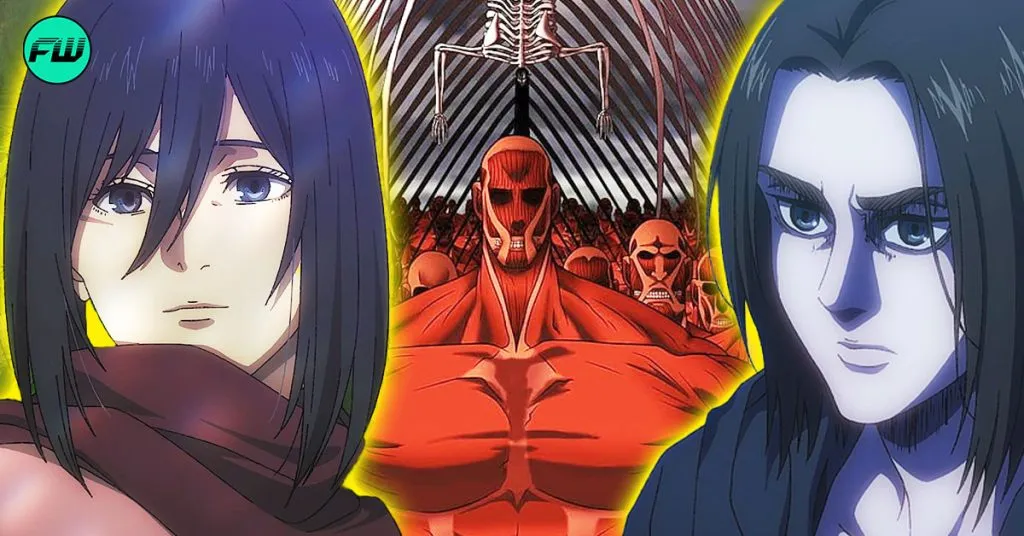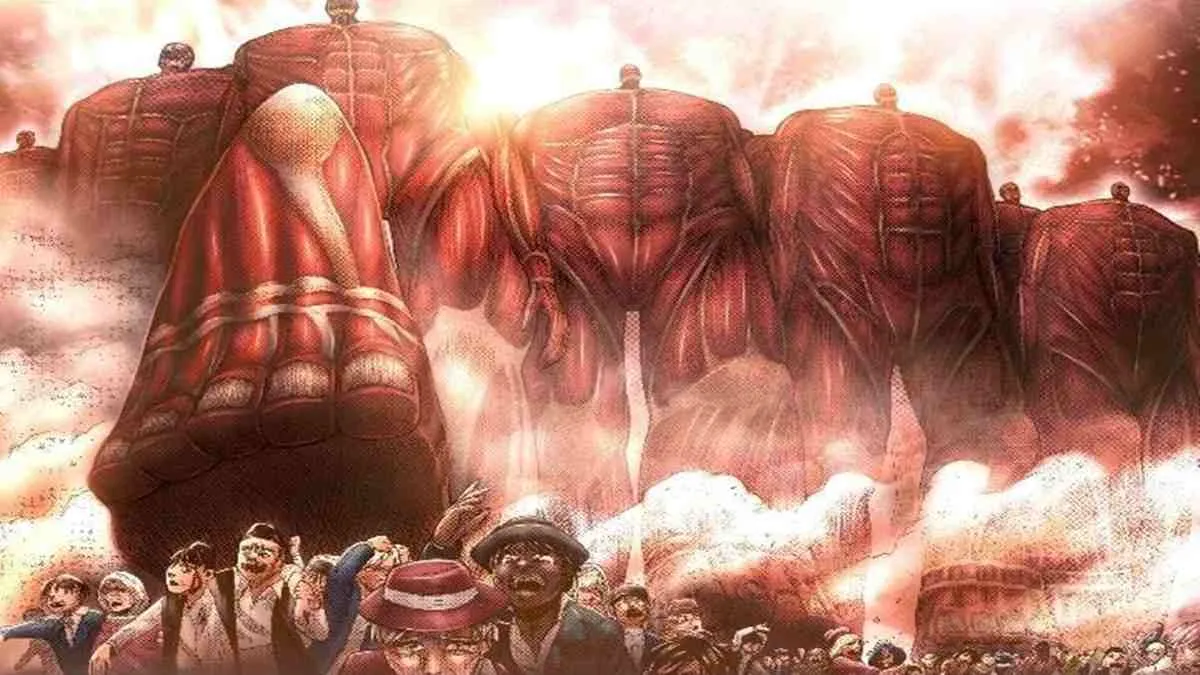The Rumbling is one of the most pivotal events in the world of Attack on Titan, encapsulating a complex mix of themes such as survival, morality, and the cycle of hatred. This cataclysmic phenomenon involves unleashing the Titans hidden within the walls, and it serves as a desperate measure by Eren Yeager to protect the Eldians from perceived threats. The implications of the Rumbling stretch far beyond mere destruction; they challenge our understanding of freedom, sacrifice, and the lengths one will go for their beliefs. But what exactly triggers this monumental event? Let’s dive deeper.
Historical Context of the Rumbling

To grasp the significance of the Rumbling, we need to look at the rich tapestry of history within Attack on Titan. The Rumbling is not an isolated incident; it’s a culmination of centuries of conflict and oppression between the Eldians and the rest of the world.
Initially, the Eldians, believed to be the descendants of Ymir Fritz, had the power of the Titans, which they used to conquer and oppress other nations. This historical oppression led to widespread animosity towards them, resulting in the Eldians being marginalized and segregated within their own societies, particularly on the island of Paradis.
Here are some key historical points to consider:
- The Founding Titan: Ymir Fritz's powers established the foundation for the Titan curse, shaping the fate of Eldians.
- The Great Titan War: An era marked by conflict, where Eldians faced severe retaliation from the global community.
- Isolationism of Paradis: The walls served as a protective barrier but also created ignorance about the world outside.
- Eren’s Decision: As he learns about the history and the suffering of his people, Eren chooses the path of the Rumbling to ensure Eldian survival.
In this light, the Rumbling emerges as a desperate bid for freedom in a world that has historically been anything but forgiving. It’s a tragic yet powerful event influenced by a legacy of violence and pain, highlighting the cyclical nature of hatred and the struggle for survival.
Also Read This: Earnings Information for Shutterstock Images
Key Characters Involved

In "Attack on Titan," the Rumbling is one of the most pivotal events, and it wouldn't be the same without a few key characters whose motivations and actions drive this monumental phenomenon. Let's take a closer look at the main players:
- Eren Yeager: The central figure of the series, Eren's transformation from a hopeful soldier to a harbinger of destruction is crucial. His decision to initiate the Rumbling stems from a desire to protect his friends and his homeland at any cost, illustrating the complexity of his character.
- Armin Arlert: As Eren's childhood friend, Armin represents the moral compass of the group. His struggle between supporting Eren's decisions and advocating for peace highlights the emotional turmoil surrounding the Rumbling.
- Mikasa Ackerman: Mikasa's unwavering loyalty to Eren drives her actions during the Rumbling. Her conflict between love and the need to stop Eren creates a poignant narrative thread that resonates with many fans.
- Reiner Braun: The Armored Titan, Reiner, embodies the struggle between Marley and Eldians. His perspective adds depth to the conflict, as he grapples with guilt and the consequences of the Rumbling for all parties involved.
These characters, among others, weave a complex tapestry that reflects the themes of freedom, sacrifice, and the impact of choices on humanity’s survival. The Rumbling is not merely an event; it's a culmination of their journeys and decisions, which makes it all the more significant.
Also Read This: Downloading Behance Images for Your Collection
Thematic Significance of the Rumbling

The Rumbling in "Attack on Titan" serves as a powerful metaphor that explores several significant themes. Here’s a breakdown of its thematic implications:
- Freedom vs. Oppression: The Rumbling symbolizes Eren's desperate quest for freedom, not just for himself but for all Eldians. This raises the question: at what cost does freedom come? It forces characters and viewers alike to confront the harsh realities of their choices.
- Cycle of Hate: The event illustrates how deeply entrenched hatred can lead to catastrophic outcomes. The Rumbling exemplifies the cyclical nature of violence, with each act of aggression perpetuating further conflict.
- Sacrifice: Many characters in this narrative face harrowing decisions that involve personal sacrifice. The Rumbling highlights the weight of these choices, illuminating the emotional toll on those involved.
- Moral Ambiguity: Eren's actions provoke discussions about morality in war. Is he a hero or a villain? This ambiguity challenges viewers to rethink their preconceived notions about right and wrong.
In essence, the Rumbling is not just a plot device; it’s a profound commentary on human nature, societal conflicts, and the consequences of our actions, making "Attack on Titan" a rich narrative deserving of thoughtful exploration.
Also Read This: How to Make Sausages at Home with a Step-by-Step Recipe
5. Consequences of the Rumbling

The Rumbling, a catastrophic event in the world of "Attack on Titan," brings with it a whirlwind of consequences that ripple through the narrative and its characters. At its core, the Rumbling represents the ultimate display of power and desperation, leading to devastating outcomes for both Marley and the Eldians of Paradis Island.
One of the most immediate consequences is the *loss of life on an unprecedented scale. The sheer number of colossal Titans trampling cities and towns results in mass destruction. For instance, Marley, which had previously oppressed the Eldians, faces brutal retribution, but this also raises questions about the morality of such an act. Is the annihilation of millions justified by the actions of a few?
Another significant consequence is the psychological toll on the survivors. Characters like Eren, Mikasa, and Armin experience intense emotional conflict, grappling with their roles in this genocide. This leads to a deep existential crisis, as they must confront the implications of their decisions. The narrative beautifully showcases how power can corrupt, forcing characters to choose between personal morals and the perceived greater good.
Furthermore, the Rumbling sparks a global shift in power dynamics. With the threat of the Titans looming, nations are forced to reevaluate their alliances and strategies. The previously unassailable Marley is now at the mercy of a force that could wipe out humanity, igniting a fierce debate about whether peace can ever be achieved.
Also Read This: GIF Magic: Creative Wonders with Imgflip
6. Fan Reactions and Theories
Many fans expressed shock and dismay at the sheer scale of destruction and the moral implications of Eren's choices. Social media platforms exploded with memes and discussions, showcasing a mix of admiration for his determination and horror at the consequences. For instance, the hashtag #TeamEren polarized fans, with some supporting his vision of freedom for Eldians at any cost, while others vehemently opposed his genocide.
As for theories, the fanbase has been creative and analytical. Some believe that Eren's actions are a desperate attempt to break the cycle of hatred and oppression, suggesting that only through total annihilation can a true peace be achieved. Others theorize about the potential for redemption—could Eren's friends find a way to stop the Rumbling and save him? This has led to discussions about the themes of free will and the nature of humanity*.
In summary, the Rumbling has sparked a vibrant dialogue about morality, freedom, and the consequences of power, making "Attack on Titan" a rich tapestry of themes that resonate deeply with its audience.
Also Read This: Uploading Videos from Facebook to YouTube – A Complete How-To Guide
Understanding the Reasons Behind the Rumbling in Attack on Titan
The Rumbling is one of the most pivotal events in the acclaimed anime and manga series, "Attack on Titan". It represents not just a physical phenomenon but also a complex narrative mechanism that encapsulates the series' themes of survival, freedom, and the cyclical nature of violence.
At its core, the Rumbling is initiated by Eren Yeager, the series' protagonist, who seeks to protect his people, the Eldians, from extinction. This drastic measure involves unleashing the power of the Founding Titan to awaken the Colossal Titans within the walls, resulting in a massive stampede that threatens to obliterate humanity outside of Paradis Island. Here are some key reasons behind this monumental decision:
- Desperation for Survival: Eren's actions stem from a deep-seated desire to ensure the survival of his people, who have been oppressed and hunted throughout history.
- Cycle of Hatred: The Rumbling is a response to the ongoing cycle of hatred and violence between Eldians and the rest of the world, showcasing the tragic consequences of such enmity.
- Freedom vs. Safety: Eren grapples with the philosophical dilemma of choosing between the freedom of his people and the safety of the world, leading to his controversial choice.
- Legacy of Power: The Rumbling highlights the burden of power and the consequences of wielding it without consideration of morality.
The Rumbling serves as a turning point in the narrative, redefining character motivations and relationships while posing ethical questions about war, sacrifice, and humanity's future.
Conclusion: The Impact of the Rumbling on the Series
The Rumbling ultimately reshapes the landscape of "Attack on Titan", emphasizing the series' exploration of moral ambiguity and the price of freedom, leaving a lasting impact on both characters and viewers alike.